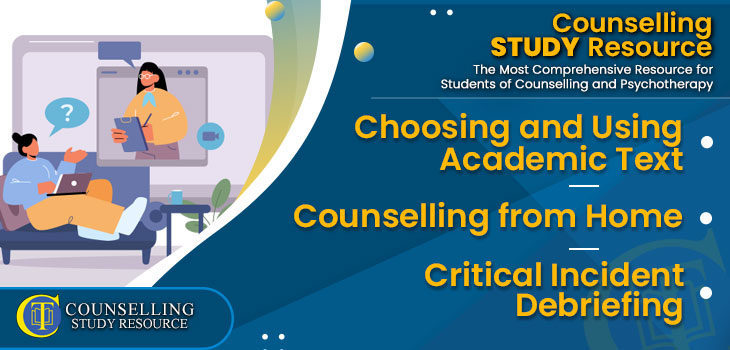282 – Counselling from Home
Choosing and Using Academic Text – Critical Incident Debriefing
NOTE: The Counselling Tutor Podcast is a free resource, which is available on the main Counselling Tutor website. We also place it in CSR for your ease of access. Unlike our other CSR resources, podcast episodes may include presenters’ opinions, and are not intended to be referenced for academic use.
In Episode 282 of the Counselling Tutor Podcast, your hosts Rory Lees-Oakes and Ken Kelly take us through this week’s three topics:
- Firstly in ‘Student Services’, Rory and Ken take us through some tips for choosing and using academic texts.
- Then in ‘Ethical, Sustainable Practice’, we look at some of the important things to consider about counselling from home.
- And lastly in ‘Practice Matters’, Rory speaks with Karen Moore about her work facilitating critical incident debriefing groups.
Choosing and Using Academic Text [starts at 02:58 mins]
Counselling Foundations is sponsored by
Counselling Skills Academy
Learn counselling techniques by seeing counselling skills used in real sessions by qualified therapists.
Real sessions - real-life presentations - real skills.
When it comes to academic reading, it’s impossible to read everything front to back – that’s why finding what is going to be most useful to you is an important skill. In this section, Rory and Ken share some of their tips and tricks when it comes to academic reading:
- Start at the index – search for your keyword and use those texts as your starting point.
- Academic reading is different from reading for pleasure – use it as a tool.
- Reference process – you are looking to refer back to the things you find.
- Choosing your format – when it comes to preference and cost, you have options on how you read these texts e.g. paperback, kindle/e-book.
- When buying a secondhand book, be careful. Any books on ethics or legislation are being constantly updated and you will want to be referencing the most recent edition.
- Look around in charity shops.
- Referencing – find out what style your learning institution wants and ask for an example. You can then use an online generator for your referencing.
- Being widely read will benefit you, your studies, and your practice.
A handout on How to Use Academic Books for Your Assignments is available for download in the green button above.
Counselling from Home [starts at 27:59 mins]
There are so many things to think about when weighing up where to set up your private practice, but it’s important that you choose what’s best for you and your clients. In this section, we see some of these things to consider about setting up your practice in your own home:
- Running your counselling practice from home has huge benefits in cost and convenience by cutting the need for travel and renting a space.
- However, there are other things to consider about whether your home is suitable to run a practice from:
- Accessibility
- Personal items e.g. family photographs.
- Parking
- Confidentiality e.g. will people be watching them come and go from your home.
- Will there be other people in the house while sessions take place? Are your rooms soundproof?
- Is there a risk of sessions being interrupted e.g. if a parcel arrives and you're the only one in the house.
- Lone working policy – When considering counselling from home, think about how to make sure you're safe.
- Are you able to leave your work in that room/space? Disengage? How will you decompress?
- Setting boundaries with clients, making sure they don’t show up at your house outside of scheduled times, planning for worst case scenarios.
- It’s all about weighing up your own situation.
Critical Incident Debriefing [starts at 45:27 mins]
The National Counselling Society is proud to sponsor Practice Matters.
NCS are really excited to have launched their Children and Young People Therapist Register for counsellors working with the younger age group.
In this week’s ‘Practice Matters’, Rory speaks with Karen Moore about her work in Critical Incident Debriefing.
The key points of this discussion include:
- Your counselling training can lead to working in a number of different places and scenarios.
- Critical Incident Debriefing – this involves working with a group of people who witnessed or have been involved in something horrific and possibly traumatic, working to psychoeducate them on anything they may experience or feel due to this event, and help them to deal with it.
- There will never be any engagement or contact with them until 48-72hrs after the event in order to allow them time to process and react.
- They are split into 3 groups:
- The people who witnessed what happened.
- The first responders.
- The people who knew the individual(s) involved in the incident.
- The groups will be kept as separate as possible.
- Explaining normal reactions to abnormal situations.
- Ensuring that they have the support they need.
- Requires confidence, thinking on your feet, and being able to navigate conflicts.


